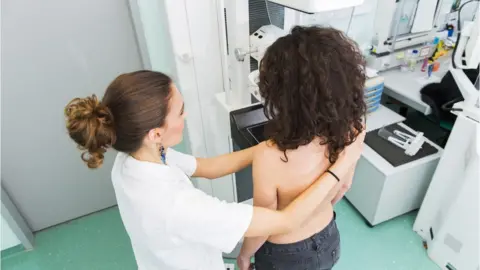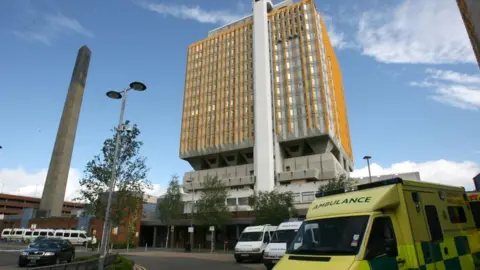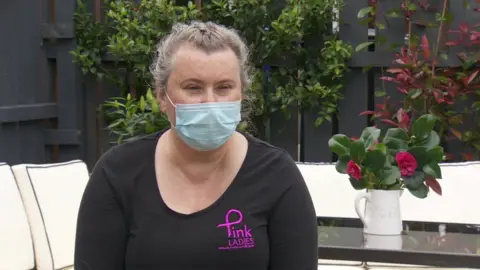Coronavirus: Potential cancer cases of 'Herculean proportions'
 Getty Images
Getty ImagesThe number of potential cancer cases coming down the track in NI is of "Herculean proportions", the Royal College of Surgeons has warned.
It comes as figures obtained by the BBC reveal a dramatic drop in gynae and colorectal cancer referrals at the regional cancer centre last month.
This is partly due to staff and facilities being re-directed to deal with coronavirus.
The Department of Health said there had "inevitably been a severe impact".
"Significant work is under way to release and redeploy some capacity to enable the resumption of urgent surgery and treatment," said the department.
It said there would be "a huge logistical and funding challenge" and there would not be a return to business as usual. "Covid-19 will be with us for some time."
Undiagnosed cancers?
The number of colorectal referrals was down by 70% in April 2020 compared to 2019, while gynae referrals have dropped by 50%.
Based on last year's figures, it is feared many cancers have yet to be diagnosed.

Mark Taylor, of the Royal College of Surgeons, said: "In any cancer, and particularly in those cancers that progress very quickly, time is of the essence.
"Clearly whilst the system has responded to Covid, we now must radically turn our attention as a system to perform timely diagnosis and treatment of those patients with cancer.
"We're about to see a situation of Herculean proportions coming our way."

Analysis: A new challenge must be met
While Northern Ireland may be winning the current Covid-19 battle, some are asking at what cost.
Coronavirus didn't replace cancer; the latter just carried on as normal.
While some patients had to put their treatment on hold, others may have developed cancer but remain unaware.
For some, a late diagnosis could be terminal.
When the initial coronavirus death toll was estimated at being about 15,000, the Department of Health transformed the Belfast City Hospital into a Nightingale hospital.
It dealt with coronavirus head-on, turning the system upside down in a matter of weeks.
Will that same vision and determination now be directed at dealing with cancer?

 PA Media
PA MediaWhile it is widely accepted the move to focus Belfast's City Hospital on Covid-19 patients was necessary, it displaced many regional cancer surgical services including complex colorectal surgery, gynae oncology, uro-oncology, chemotherapy services and associated support services.
The system has also seen a reduction in red flag referrals, which fell by 70% in some specialities as patients were too afraid to see GPs, attend emergency departments or had their hospital appointments cancelled.
Dr Frances O'Hagan, a GP, said: "We are going to have a lot of people coming forward with much later presentations.
"It's always more difficult to treat a cancer that's found later on in the pathway.
"It is really important to come forward with your concerns and we'll address them."
Mark Taylor said the system must now react to tackling cancer the same way it reacted to tackling coronavirus, approaching it as a region rather than as individual health trusts.
While surgery has been affected, so has screening for bowel, breast and cervical cancer.
Diagnostic testing for colorectal cancers also had to be discontinued as there could be viral particles present in faeces which placed healthcare staff at risk.
'Don't put it off if you have a lump or a bump'
Margaret Kissane is receiving treatment for stage four breast cancer at Altnagelvin Hospital.

She feels lonely as she now speaks to her oncologist over the phone, but adds that people should not be deterred from getting checked by the Covid-19 crisis.
"Don't put it off if you have a lump or a bump, and don't be put off by GPs and those in the hospital wearing PPE, it is better to get checked out - just go to these places as normal," she said.
Private hospitals
In order to deal with the crisis, the Department of Health employed the services of Northern Ireland's three private clinics.
More than 700 cancer procedures - including operations - were carried out at Kingsbridge Private Hospital, the Ulster Independent Clinic and the North West Independent Hospital.
However, complex surgical procedures were mostly delayed as the independent sector could not provide high dependency or intensive care beds, so there has been a build-up of those cases.
Claire McConville, 47, from Craigavon, was diagnosed with an aggressive form of breast cancer last year.
She has undergone chemotherapy, radiotherapy and surgery, but further surgery was put on hold due to the pandemic.
"I'm worried about my physical health, but the delay is also taking its toll emotionally," she said.
"I'm struggling to sleep as my head is racing with anxiety overnight.
"I know that many other people are in the same situation, so how long will it take for people like me, living with cancer, to get the urgent treatment that we need?"
Meanwhile, Macmillan Cancer Support said it has experienced an unprecedented demand and has called on the assembly to urgently develop a recovery plan for cancer services.
